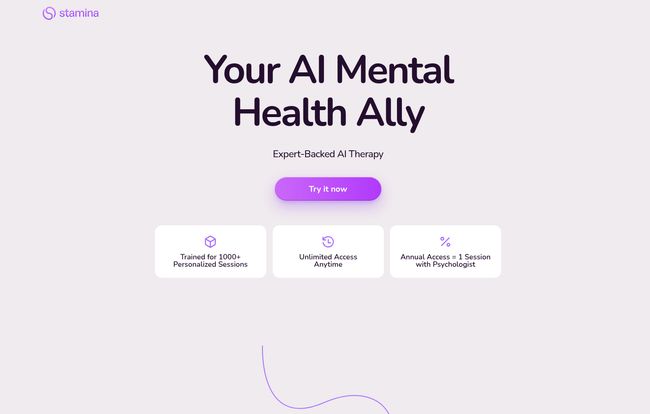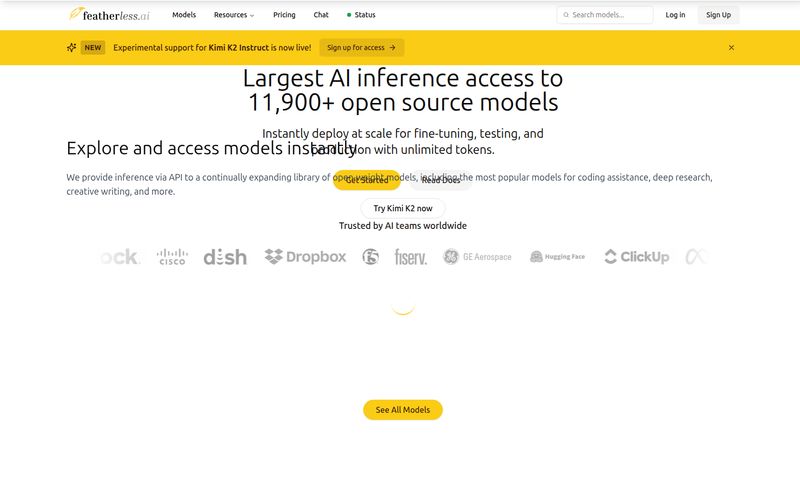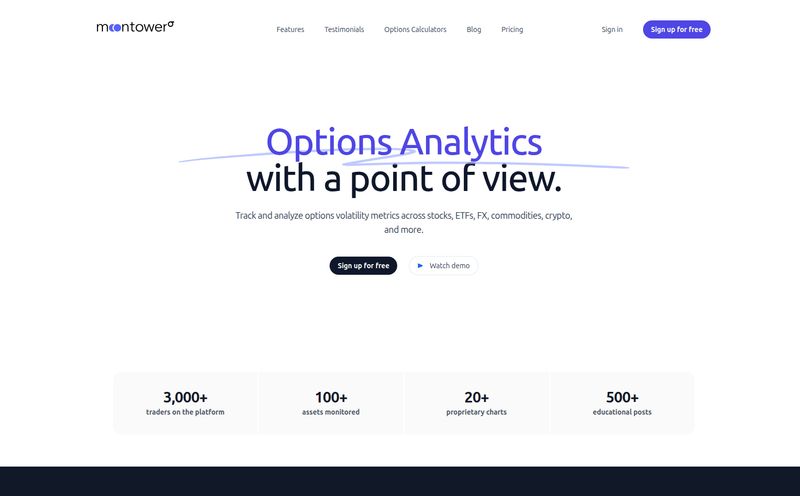The world feels like it’s spinning faster than ever. Between the doomscrolling, the hustle culture, and just… well, everything, it’s no wonder so many of us are walking around with a low-grade hum of anxiety. As someone who’s spent years neck-deep in online trends and traffic, I've seen the search queries for “stress relief” and “anxiety help” go through the roof. It's a silent epidemic shouted into a search bar.
So, when a new tool pops up claiming to be an “AI Mental Health Ally,” my curiosity gets the better of me. My inner cynic, honed by years of seeing overhyped tech, immediately raises an eyebrow. An AI psychologist? Really? But my inner optimist—the one that loves seeing tech actually solve real problems—pulls up a chair. The tool in question is called Stamina, and I decided to take a look.
So, What is Stamina, Exactly?
On the surface, Stamina presents itself as an AI-based psychologist designed to help you manage anxiety and stress. It's not just another meditation app or a digital journal. The pitch is that it provides expert-backed AI therapy. Think of it less like a calming soundscape and more like a self-help book that actually talks back to you, available 24/7, right on your phone.
The platform claims its AI has been trained on over 1,000 personalized therapy sessions and is supported by a network of more than 200 mental health profesionals. Now, that’s the part that caught my attention. It suggests the AI isn't just pulling responses out of thin air but is grounded in established therapeutic techniques, likely things like Cognitive Behavioral Therapy (CBT). For anyone who's tried to find a therapist, you know the waitlists can be brutal. The idea of immediate, accessible support is incredibly appealing.

Visit Stamina AI
First Impressions and Core Features
The first thing you notice on their site is the clean, minimalist design. It's all soft purples and gentle curves. Smart. If you're building a tool for anxious people, you don't want to hit them with a chaotic, high-stress interface. It feels calm, which is a good start.
Here’s what Stamina brings to the table:
- Personalized AI Conversations: This is the main event. The app engages you in text-based therapy sessions. It learns from your input to offer tailored guidance, helping you unpack anxious thoughts and build coping mechanisms.
- Always-On Accessibility: This is probably the biggest advantage over traditional therapy. Having a panic attack at 3 AM? Can't shake a worry on a Sunday afternoon? Stamina is there. No appointments needed. It’s a mental health first-aid kit in your pocket.
- Evidence-Backed Methods: Again, the link to 200+ professionals is huge for credibility. It means the guidance you're receiving isn't just feel-good fluff; it’s built on a foundation that human therapists use. This is a far cry from asking a generic chatbot for advice.
The Million-Dollar Question: Can an AI Actually Be a Therapist?
Okay, let's get into the weeds. This is the big debate in the digital wellness space. Some people swear by these tools, others are horrified by the concept. In my experience, the truth is somewhere in the middle.
On one hand, the accessibility is undeniable. For someone who is nervous about talking to a human, or can't afford weekly sessions, or lives in a therapy desert, a tool like Stamina could be a genuine lifeline. It lowers the barrier to entry for getting help. It’s a way to practice emotional hygiene without the stigma or logistical nightmares that sometimes come with seeking care. There's a certain freedom in telling your deepest anxieties to a machine that you know won't judge you.
However, let's not get carried away. An AI, no matter how sophisticated, cannot replicate the genuine warmth, intuition, and nuanced understanding of a human therapist. It can't read your body language through a screen or catch the subtle hesitation in your voice. It simulates empathy; it doesn’t feel it. And that's a critical distinction. Effectiveness also hinges entirely on you. You have to be willing to engage honestly and do the work. The AI can guide you, but it can't forge the path for you.
What About the Price?
This is where things get a bit… interesting. I went looking for a pricing page, as any good reviewer would, and was met with a classic “Page Not Found” error. A rookie mistake for a web launch? Maybe. Or maybe it's intentional.
The provided info states that free access is available during the testing phase only. My guess is that Stamina is in a public beta. They're gathering data, refining the AI, and letting people use it for free to build a user base before switching to a subscription model. Honestly, that’s my advice to you: if you’re even remotely curious, try it now while it costs you nothing but a bit of time. These things rarely stay free forever.
Who Is Stamina Really For?
This isn't a one-size-fits-all solution. It's a tool, and like any tool, it's right for some jobs and wrong for others.
| Stamina Could Be a Great Fit If... | You Might Want to Stick to Human Therapy If... |
|---|---|
| You're dealing with mild to moderate stress or anxiety. | You have a severe or complex mental health diagnosis. |
| You want to learn practical coping skills and CBT techniques. | You are in crisis or experiencing thoughts of self-harm. (Please contact a crisis hotline immediately) |
| You're on a waitlist for a therapist and need support now. | You crave the deep, empathetic connection of human interaction. |
| You feel more comfortable opening up anonymously at first. | You need help with deep-seated trauma or relational issues. |
Important Disclaimer: I’m an SEO guy, not a doctor. This article is not medical advice. Always consult with a qualified healthcare provider for any mental health concerns.
My Final Take as a Jaded Tech Watcher
After looking at dozens of wellness apps, I've become pretty hard to impress. Stamina, however, has my attention. It’s not trying to be a simple mood tracker, it’s aiming higher. The emphasis on being “expert-backed” and built on therapeutic principles gives it a gravity that many competitors lack.
Is it going to replace human therapists? No, and it shouldn't. But that's not the point. The point is to make mental health support more accessible, more immediate, and less intimidating. Stamina feels like a solid step in that direction. It's a promising “ally,” just like its tagline says. It's a supporter, a tool, a guide for when you need one. And for many people, that's more than enough to make a real difference.
Frequently Asked Questions About Stamina
- Is Stamina really free to use?
- For now, it seems so. The platform states it's free during its current testing phase. It will likely move to a paid subscription model in the future, so now is the best time to try it out.
- Can Stamina replace my regular therapist?
- No. Stamina is best viewed as a supplemental tool for support and skill-building, not a replacement for professional human therapy, especially for complex or severe conditions.
- Is it safe to use an AI for mental health?
- Stamina is based on evidence-backed therapeutic methods and supported by professionals, which makes it safer than a generic chatbot. However, it's not equipped to handle severe crises. If you are in distress, please seek help from a medical professional or a crisis support service.
- How does Stamina protect my privacy?
- This is a crucial question for any health app. While I couldn't access a detailed privacy policy (another sign of its early stage), you should always review a service's policy before sharing sensitive information. Reputable apps use encryption and anonymization to protect user data.
- What makes Stamina different from an app like Headspace or Calm?
- While Headspace and Calm focus primarily on meditation and mindfulness content, Stamina focuses on interactive, conversational AI therapy sessions designed to help you actively work through anxious thoughts and stress.
Conclusion
The conversation around mental health is changing, and technology is a big part of that shift. Tools like Stamina are democratizing access to support, putting it directly into the hands of people who need it. It’s not a perfect system, and the digital world will never fully replace the power of human connection. But it doesn’t have to. By providing an accessible, on-demand ally, Stamina offers a valuable resource in the modern mental wellness toolkit. And in a world that keeps spinning faster, having a tool to help you find your footing is a very good thing indeed.
Reference and Sources
- Stamina Official Website
- National Institute of Mental Health (NIMH) on Anxiety Disorders
- American Psychological Association on Cognitive Behavioral Therapy (CBT)
- Effectiveness of a Computerized Text-Based CBT Intervention for Post-Disaster Distress (JMIR Study)



